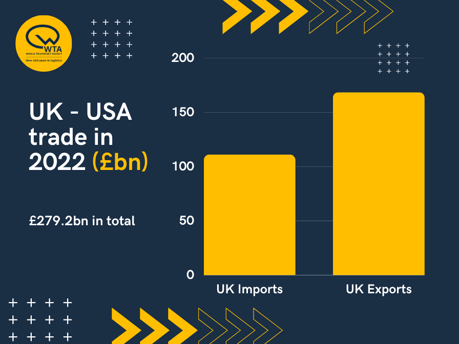On 8th June 2023, the UK and USA announced the signing of the Atlantic Declaration agreement. Described as a “Twenty-First Century U.S.-UK Economic Partnership”, which would cover the “full spectrum of our economic, technological, commercial and trade relations”.
Sounds promising, then, for UK businesses trading with the USA.
Somewhat surprising to, as in September 2022 then Prime Minister Liz Truss ruled out the prospect of a US free trade deal in the short or medium term on a visit to the States. A move which shelved most businesses' hopes of an improving trade relationship anytime soon.
Added to that President Joe Biden signing the Inflation Reduction Act, a hugely protectionist piece of legislation, aimed at encouraging manufacture in the US. Leading trade association Make UK suggested this legislation was “exclusively negative for the UK” in a critical report highlighting the manufacturing sectors’ desire for a UK-USA FTA.
So, you could be forgiven for left wondering: what is this new agreement all about?
Well, the UK government has released a 4071-word report on the benefits of this deal, suggesting an encouraging level of enthusiasm. But beyond the PR spin, here we take a deeper (but shorter) look at the tangible benefits the Atlantic Declaration offers to firms on both sides of the pond.

Firstly, and crucially, this is not a broad free trade deal. This is funding, legislative support and cooperation for some targeted sectors, which are deemed important for long term prosperity, security and influence on the world stage. For most companies, trading terms between the UK and US will remain the same, however within the targeted sectors there are some crucial developments.
Most significantly, those in the automotive industry could be substantial beneficiaries.
The Atlantic Declaration states an intention to begin negotiations on a Critical Minerals Agreement, which covers the five most important minerals needed for electric vehicles – cobalt, graphite, lithium, manganese, and nickel.
The UK is a net exporter of these materials for EV batteries to the US. Under the agreement, US companies who source or process those materials from firms in the UK, will be available for tax credits and subsidies under the US’ Inflation Reduction act. Meaning US firms are incentivised to choose British suppliers.
What is the US’ Inflation Reduction Act?
Signed in August 2022, the US’ Inflation Reduction Act contains $500 billion in new federal spending that aims to boost clean energy production, reduce healthcare costs, and increase tax revenues.
According to the White House, the Inflation Reduction Act is “aimed squarely at building a better America and delivering on President Biden’s vision to make sure the United States is powered by American workers.”
It's warm news for the automotive industry, as until now the Inflation Reduction Act has had only negative consequences for UK firms, prioritising sourcing from the USA. However, importantly, the Atlantic Declaration only states an intention to begin negotiations on a Critical Minerals Agreement. It’s not in place yet. But could become only the second example of foreign firms benefitting from the Inflation Reduction Act, with a similar agreement already in place for Japan.
The Atlantic Declaration also offers support for those in the military and defence sectors. President Joe Biden is to ask Congress to add the UK as a ‘domestic source’ for defence goods, covered by Title III of the Defense Production Act.
Again, this opens UK manufacturers of new, state-of-the-art technologies needed for military and homeland security purposes to US finance. Loans, loan guarantees, purchases, and purchase commitments are available under the act to improve, expand, and maintain domestic production capabilities. If approved, UK companies would be considered domestic production.
Meanwhile efforts are being made to modernise export control laws and streamline defence trade between the nations, meaning the customs burden for firms in the defence industry should be simplified.
"A new economic partnership for a new age, of a kind that has never been agreed before... We can depend on each other with absolute conviction. When the United States and the United Kingdom stand together, the world is a safer, better and more prosperous place."
UK Prime Minister Rishi Sunak
In the declaration there’s also an encouraging acknowledgement of the need to build more resilient supply chains, however this is only in the context semiconductors and other “sensitive technologies”. It’s disappointing that broader support is not being considered for all businesses who have been subject to ruthless volatility in recent years regarding their supply lines.
A U.S.-UK Strategic Technologies Investor Council will be formed in the next 12 months to support businesses in the semiconductors, quantum technologies, artificial intelligence, cutting-edge telecommunications, and synthetic biology sectors.
However, there are no specifics on the amount of funding which will be available, only that experts will analyse funding gaps and unlock new private investment.
There’s also going to be greater scrutiny on outward investment towards threatening emerging technologies in “countries of concern”. Whilst not directly going to impact UK and US firms, it could mean more private sector investment for certain industries, with money that was previously heading overseas.
Alongside this, there will be increased scrutiny on exports of sensitive technologies to these countries of concern.
A final key detail includes a commitment to a "new UK-US Data Bridge" which would allow UK firms to transfer data freely to certified US organisations without paying a levy. Downing Street estimate the change will affect around 55,000 UK businesses and result in £92.4m of direct savings per annum.
In the know, with Catherine Godwin
Business Development Manager, WTA Group
"The US is the UK's largest individual trading partner, accounting for 16.3% of total trade. A nation which the UK has a huge exporting surplus, therefore any deregulation and support is welcome, even if it's only across certain targeted sectors.
But it could be the beginnings of greater trading cooperation between the nations, with both sides seemingly keen to reduce reliance on China. Sunak stated at a banquet in 2022 that the "golden-era" of the UK's relationship with China is over."
There is no doubt this deal falls way short of the free trade deal that firms on both sides of the Atlantic Ocean are calling for. Its focus is far more political. The governments of two countries leaning on each other in response to global threats.
There is an air of reluctance about the support being offered to businesses, motivated by the need to maintain world-stage influence with a controlling stake in the key industries, rather than a genuine appetite to help all businesses in both nations grow. However, the support for these sectors is obviously welcome and and could pave the way for more substantial trade deals in the years to come.
If you have any questions about how the Atlantic Declaration could boost trade with the US, please get in touch with Catherine Godwin, our expert on UK exports. Having been in the industry for 20 years, there isn't much Catherine doesn't know about international trade.
Alternatively, we have published a whitepaper exploring the future of the UK and USA's relationship with China as a source for imports. Including a detailed look at alternatives for firms on both sides of the Atlantic Ocean. It's available for free below.









